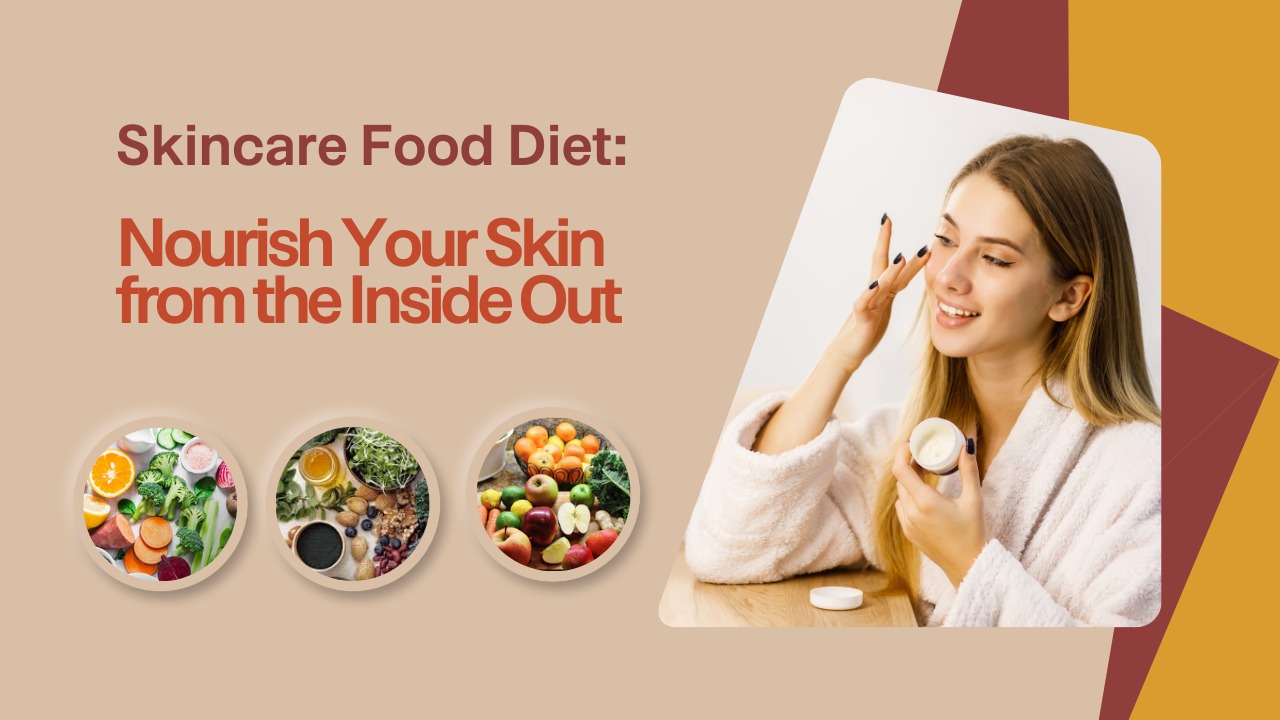Healthy skin goes beyond what you apply topically; it’s influenced by what you put into your body. A skincare food diet focuses on nourishing your body with the right nutrients to support your skin from the inside out. While creams and cleansers have their place, the real transformation comes through the foods you consume.
The concept of a skincare food diet is simple: by incorporating skin-friendly foods into your meals, you can improve your complexion, address skin concerns, and slow the aging process. Nutrition plays a crucial role in enhancing skin texture, tone, and overall health. Certain foods provide the vitamins and minerals needed for healthy, glowing skin.
In this guide, we’ll dive into the foods that are best for your skin, as well as those to avoid. We’ll also offer meal ideas that make it easier to embrace a skincare food diet, so you can nourish your skin from within and achieve a natural, radiant glow.
How Nutrition Affects Your Skin
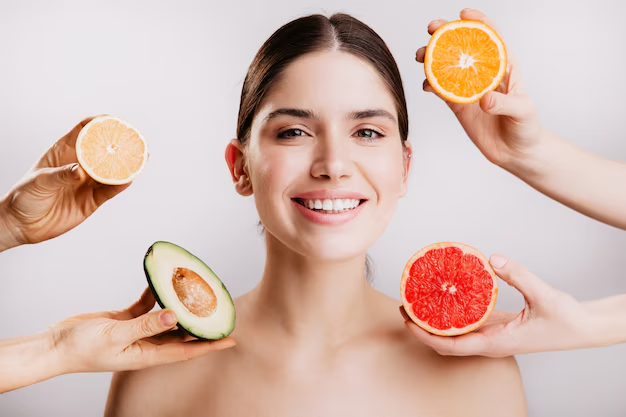
Your skin is a reflection of your internal health. Every cell in your body — including your skin cells — depends on nutrients to grow, heal, and function. Here’s how food directly impacts your skin:
Collagen Support: Collagen is the key structural protein that keeps the skin firm, smooth, and youthful. To promote collagen production, it’s essential to include nutrients like vitamin C, zinc, and amino acids in your diet. These nutrients help boost collagen formation, which can improve skin elasticity and reduce the appearance of wrinkles. A skincare food diet rich in these nutrients supports skin strength and helps maintain its youthful appearance.
Moisture Balance: Healthy fats, particularly omega-3 fatty acids, play a vital role in maintaining the skin’s moisture barrier. They help prevent the skin from becoming dry, flaky, or irritated. By including these fats in your skincare food diet, you ensure your skin stays hydrated and soft, even in harsh environments. Omega-3s help lock in moisture and keep the skin looking smooth and plump.
Inflammation Control: An anti-inflammatory diet can significantly reduce skin issues like breakouts, redness, and irritation. Foods rich in anti-inflammatory properties help calm the skin, while inflammatory foods, like processed sugars and unhealthy fats, can trigger acne, sensitivity, and other skin problems. A skincare food diet focused on reducing inflammation supports clearer, healthier skin by balancing the body’s inflammatory response.
Oxidative Stress Defense: Antioxidants are essential for protecting the skin from oxidative stress, which is caused by harmful molecules known as free radicals. These molecules can accelerate the aging process and lead to skin damage. By including antioxidant-rich foods in your skincare food diet, you can neutralize free radicals and prevent premature aging, giving your skin a healthier, more youthful appearance.
15 Superfoods for Clear, Glowing Skin
Here are some of the best foods to incorporate into your daily routine for stronger, more radiant skin:
Salmon and Other Oily Fish
Salmon and other oily fish are excellent additions to any skincare food diet. These fish are rich in omega-3 fatty acids, which help maintain the skin’s moisture barrier and prevent dryness. Omega-3s also reduce inflammation, keeping the skin calm and hydrated. Regular consumption of oily fish can support smooth, glowing skin by providing essential fats that promote skin health.
In addition to omega-3s, oily fish like salmon are packed with high-quality protein and antioxidants, which play a key role in collagen production and skin repair. Including these fish in your skincare food diet can help combat signs of aging and support overall skin vitality.
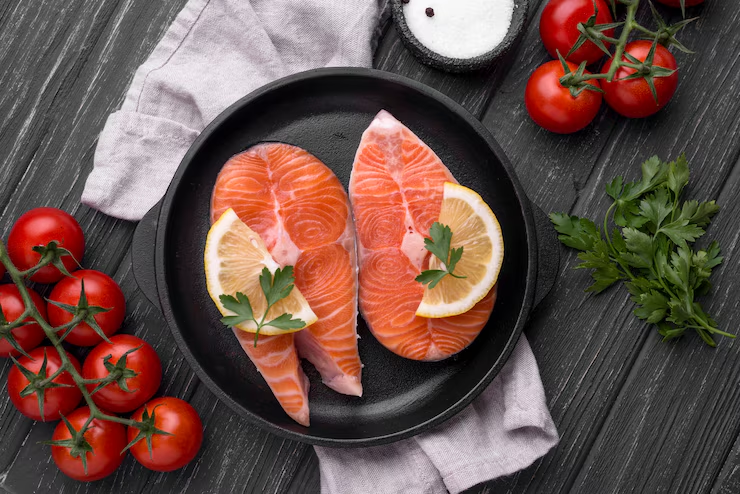
Benefits
Boosts Hydration: Oily fish like salmon are rich in omega-3 fatty acids, which help maintain the skin’s moisture barrier, preventing dryness and keeping your skin hydrated.
Reduces Inflammation: Omega-3s in salmon have anti-inflammatory properties that help calm irritated skin, reduce redness, and prevent breakouts.
Promotes Collagen Production: The high-quality protein and nutrients in oily fish support collagen synthesis, which helps maintain skin elasticity, firmness, and a youthful appearance.
Avocados
Avocados are a fantastic addition to a skincare food diet due to their high content of healthy fats, particularly monounsaturated fats. These fats help nourish the skin’s moisture barrier, keeping it hydrated and preventing dryness or flakiness. They also support the absorption of fat-soluble vitamins that are crucial for maintaining skin health.
Beyond healthy fats, avocados are rich in antioxidants, such as vitamin E, which protect the skin from oxidative stress and help reduce the appearance of fine lines and wrinkles. By including avocados in your skincare food diet, you can promote smoother, more youthful-looking skin.
Benefits
Hydrates and Moisturizes: Avocados are packed with healthy fats that help maintain the skin’s moisture barrier, keeping your skin hydrated and preventing dryness or flakiness.
Protects Against Skin Damage: Rich in antioxidants like vitamin E, avocados help neutralize free radicals, protecting the skin from oxidative stress and reducing the appearance of wrinkles and fine lines.
Supports Skin Repair: The healthy fats and vitamins in avocados promote collagen production and skin regeneration, supporting overall skin health and helping to repair damaged skin cells.
Sweet Potatoes
Sweet potatoes are a great addition to any skincare food diet, thanks to their high levels of beta-carotene, which the body converts into vitamin A. This vitamin is essential for skin health, as it helps promote cell turnover, repair damaged skin, and maintain a healthy skin barrier. Regular consumption of sweet potatoes can lead to smoother, more radiant skin.
In addition to beta-carotene, sweet potatoes are rich in antioxidants that help protect the skin from oxidative stress and environmental damage. By including sweet potatoes in your skincare food diet, you support your skin’s natural defense system, helping it stay youthful and glowing.

Promotes Healthy Skin: Sweet potatoes are rich in beta-carotene, which is converted into vitamin A. This helps promote skin cell turnover, repair damage, and maintain a healthy, glowing complexion.
Protects Against Skin Damage: The antioxidants in sweet potatoes help protect the skin from oxidative stress and environmental damage, reducing the risk of premature aging and skin issues.
Improves Skin Tone: Regular consumption of sweet potatoes can help even out skin tone and reduce the appearance of blemishes and dark spots, leading to a more radiant and smooth complexion.
Tomatoes
Tomatoes are a powerful addition to any skincare food diet, thanks to their high content of lycopene, a potent antioxidant. Lycopene helps protect the skin from harmful UV rays, reducing the risk of sun damage and premature aging. It also fights free radicals, promoting smoother, healthier skin.
In addition to lycopene, tomatoes are rich in vitamin C, which supports collagen production and helps maintain skin elasticity. Including tomatoes in your skincare food diet can help brighten the skin, reduce wrinkles, and promote a youthful, radiant complexion. Eating them regularly can support overall skin health and protection.
Benefits
Protects from Sun Damage: The lycopene in tomatoes helps shield the skin from harmful UV rays, reducing the risk of sunburn and long-term sun damage.
Boosts Collagen Production: Rich in vitamin C, tomatoes support collagen synthesis, which helps maintain skin elasticity and firmness, reducing the appearance of wrinkles.
Promotes Even Skin Tone: The antioxidants in tomatoes help reduce dark spots and blemishes, leading to a more even, radiant skin tone.
Walnuts
Walnuts are a great addition to any skincare food diet due to their rich content of omega-3 fatty acids, which help keep the skin hydrated and prevent dryness. These healthy fats also support the skin’s natural barrier, ensuring it stays moisturized and protected from environmental damage.
In addition to omega-3s, walnuts are packed with antioxidants, such as vitamin E, that protect the skin from oxidative stress. Regularly including walnuts in your skincare food diet can help reduce inflammation, improve skin texture, and support a smoother, more youthful complexion.
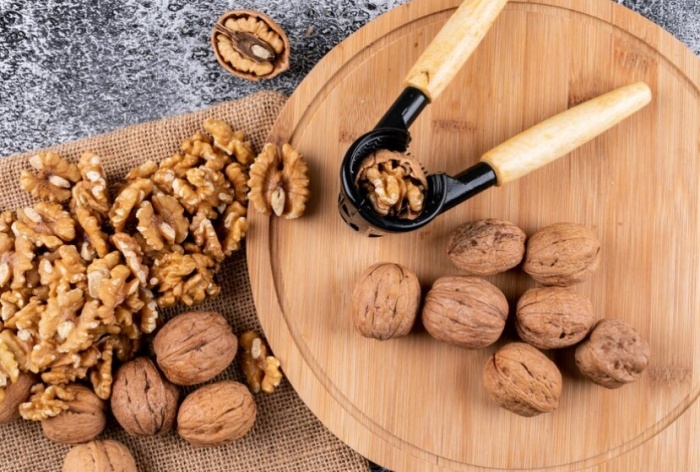
Benefits
Boosts Skin Hydration: The omega-3 fatty acids in walnuts help maintain the skin’s moisture barrier, preventing dryness and promoting a hydrated, plump appearance.
Reduces Inflammation: Walnuts contain anti-inflammatory properties that can help reduce skin irritation, redness, and breakouts, supporting a calm complexion.
Protects Against Skin Damage: Rich in antioxidants like vitamin E, walnuts protect the skin from oxidative stress and free radicals, which can prevent premature aging and maintain skin health.
Sunflower Seeds
Sunflower seeds are a fantastic addition to any skincare food diet due to their high vitamin E content. Vitamin E is a powerful antioxidant that helps protect the skin from free radical damage, reducing the signs of aging and promoting a youthful glow. These seeds also help maintain skin moisture and improve overall skin texture.
In addition to vitamin E, sunflower seeds are rich in healthy fats and zinc, which support skin healing and reduce inflammation. Including sunflower seeds in your skincare food diet can help reduce breakouts, improve skin elasticity, and promote clear, radiant skin.
Reduces Signs of Aging: Sunflower seeds are rich in vitamin E, a powerful antioxidant that helps protect the skin from free radicals, reducing the appearance of wrinkles and fine lines.
Promotes Skin Healing: The zinc content in sunflower seeds supports skin repair and reduces inflammation, helping to heal acne and other skin issues.
Improves Skin Hydration: The healthy fats in sunflower seeds help maintain the skin’s moisture barrier, keeping the skin hydrated, soft, and smooth.
Green Tea
Green tea is an excellent addition to any skincare food diet due to its rich antioxidant content, particularly catechins. These antioxidants help protect the skin from free radicals, reducing oxidative stress and preventing premature aging. Green tea also has anti-inflammatory properties that can calm irritated skin and reduce redness.
In addition to its antioxidants, green tea helps improve skin elasticity and hydration. Regularly consuming green tea as part of your skincare food diet can promote a healthier complexion by fighting acne and blemishes, enhancing skin tone, and supporting overall skin health for a glowing appearance.
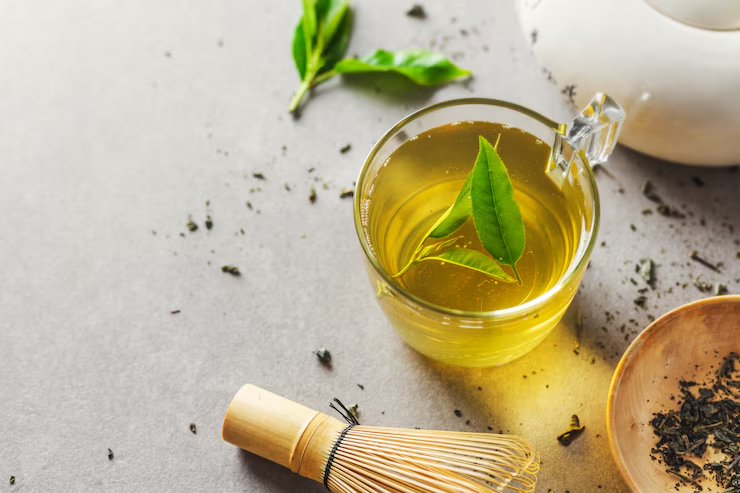
Fights Signs of Aging: Green tea is rich in antioxidants, particularly catechins, which help protect the skin from free radicals, reducing the appearance of fine lines and wrinkles.
Reduces Inflammation: The anti-inflammatory properties of green tea help calm irritated skin, reduce redness, and prevent flare-ups from conditions like acne or rosacea.
Improves Skin Tone: Green tea can enhance skin elasticity and hydration, promoting a more even skin tone and a youthful, radiant complexion.
Bell Peppers
Bell peppers are a great addition to any skincare food diet, especially due to their high vitamin C content. Vitamin C is essential for collagen production, which helps maintain skin elasticity and firmness. Regular consumption of bell peppers can help reduce the appearance of fine lines and promote smooth, youthful-looking skin.
In addition to vitamin C, bell peppers are rich in antioxidants, including beta-carotene, which helps protect the skin from oxidative stress and sun damage. Adding bell peppers to your skincare food diet can boost your skin’s defense against aging, reduce inflammation, and support a radiant complexion.
Benefits
Boosts Collagen Production: Bell peppers are rich in vitamin C, which supports collagen synthesis, helping to maintain skin firmness and reduce wrinkles.
Protects from Sun Damage: The antioxidants in bell peppers, including beta-carotene, help protect the skin from oxidative stress and harmful UV rays, reducing the risk of sun damage.
Reduces Inflammation: The anti-inflammatory properties of bell peppers can help calm irritated skin, reduce redness, and prevent breakouts, promoting clearer and healthier skin.
Broccoli
Broccoli is a powerhouse vegetable to include in any skincare food diet, thanks to its rich nutrient profile. It is packed with vitamin C, which supports collagen production, helping to maintain skin elasticity and reduce the appearance of fine lines. Additionally, broccoli contains sulforaphane, a compound that has powerful antioxidant and anti-inflammatory properties, helping to protect the skin from oxidative damage.
Regularly including broccoli into your skincare food diet can help detoxify the skin, improve its texture, and reduce the risk of inflammation-related skin issues. This cruciferous vegetable is an excellent choice for glowing, youthful-looking skin.

Benefits
Supports Collagen Production: Broccoli is rich in vitamin C, which aids in collagen synthesis, helping to maintain skin firmness and reduce wrinkles.
Protects Against Skin Damage: The sulforaphane in broccoli has antioxidant and anti-inflammatory properties, helping to protect the skin from oxidative stress and environmental damage.
Improves Skin Texture: Regular consumption of broccoli can help detoxify the skin, enhance its texture, and reduce inflammation, promoting a smoother, healthier complexion.
Berries
Berries, such as blueberries, strawberries, and raspberries, are an excellent addition to any skincare food diet due to their high antioxidant content. Packed with vitamin C and anthocyanins, these antioxidants help protect the skin from free radicals, reducing signs of aging and promoting a youthful appearance. They also support collagen production, which keeps skin firm and smooth.
In addition to their antioxidants, berries are rich in fiber, which helps flush out toxins and support clear skin. Including berries in your skincare food diet can improve skin texture, reduce inflammation, and promote a glowing, healthy complexion.
Benefits
Protects Against Aging: Berries are rich in antioxidants like vitamin C and anthocyanins, which protect the skin from free radicals and reduce the appearance of wrinkles and fine lines.
Boosts Collagen Production: The vitamin C in berries supports collagen synthesis, helping to maintain skin elasticity and firmness for a youthful look.
Reduces Inflammation: Berries have anti-inflammatory properties that help calm irritated skin, reduce redness, and promote clearer, smoother skin.
Foods That Can Harm Your Skin
Just as some foods nourish the skin, others can be damaging. Reducing or eliminating the following can help keep your skin clearer and more youthful:
Sugar and High-Glycemic Carbs: Foods that cause a rapid spike in blood sugar can lead to inflammation in the body, which in turn can affect the skin. High-glycemic carbs, like white bread and sugary snacks, may also break down collagen, the protein responsible for skin elasticity. Avoiding these in your skincare food diet can help reduce the risk of premature aging and breakouts.
Dairy Products: For some people, dairy products such as milk and cheese can trigger acne flare-ups. This is due to hormones or milk proteins that can cause an increase in oil production and clogged pores. If you’re focusing on a skincare food diet, consider limiting dairy to help manage skin conditions like acne.
Processed and Fried Foods: Processed and fried foods are often packed with unhealthy oils, preservatives, and additives that can increase inflammation within the body. This can lead to skin irritation, acne, and excessive oil production. Including whole, fresh foods in your skincare food diet can help prevent these issues and keep your skin looking healthy.
Alcohol: Alcohol can have a drying effect on the skin, which leads to dehydration and dullness. It also impairs the body’s ability to detoxify, making it harder for the skin to flush out toxins. To maintain a healthy complexion, it’s best to limit alcohol in your skincare food diet and stay hydrated.
Salty Snacks: Excessive salt intake can lead to water retention, causing your skin to look puffy and tired. Too much sodium can also dehydrate your skin, making it more prone to wrinkles and fine lines. To support skin health, try reducing salty snacks in your skincare food diet and opt for healthier alternatives.
Nutrients That Your Skin Craves
| Nutrient | Why It’s Important | Where to Get It |
|---|---|---|
| Vitamin C | Boosts collagen, repairs damage | Citrus fruits, peppers, kiwis |
| Vitamin A | Speeds up skin renewal | Carrots, sweet potatoes, spinach |
| Vitamin E | Prevents cell damage | Almonds, sunflower seeds, avocados |
| Zinc | Fights bacteria and acne | Legumes, nuts, shellfish |
| Omega-3 Fatty Acids | Reduces dryness and irritation | Fish, flaxseeds, chia seeds |
| Selenium | Protects against UV damage | Brazil nuts, eggs |
| Polyphenols | Slows aging process | Green tea, grapes, dark chocolate |

One-Day Meal Plan for Healthy Skin
Here’s how you can structure your meals in a day to feed your skin from the inside out:
Breakfast
A smoothie with spinach, frozen blueberries, banana, and almond milk
Whole grain toast topped with avocado and lemon juice
Mid-Morning Snack
A handful of sunflower seeds and walnuts
Cup of warm green tea
Lunch
Grilled salmon with quinoa, steamed broccoli, and sweet potato wedges
Side of mixed greens with olive oil and lemon
Afternoon Snack
Fresh cucumber slices with hummus
A few strawberries or orange slices
Dinner
Stir-fried tofu or chicken with colorful bell peppers, bok choy, and brown rice
Herbal tea (like peppermint or chamomile)
Evening Treat
A square of dark chocolate (at least 70% cocoa)
Final Thoughts
Adopting a skincare food diet is one of the most natural and sustainable ways to achieve clear, glowing skin. Rather than relying solely on topical products, nourishing your body from within helps build a solid foundation for long-term skin health.
The right foods supply your skin with essential vitamins, antioxidants, and healthy fats that support repair, hydration, and protection against aging and breakouts. At the same time, avoiding processed and inflammatory foods helps reduce common skin concerns like acne, dryness, and dullness.
By embracing a balanced, nutrient-rich skincare food diet, you not only enhance your complexion but also improve your overall well-being. Beautiful skin truly begins on your plate—what you eat matters just as much as what you apply. Let your daily meals become a natural part of your beauty routine.
FAQs
- What is a skincare food diet ?
A skincare food diet is a way of eating that focuses on consuming foods rich in vitamins, antioxidants, healthy fats, and hydration to support healthy skin from the inside out. It emphasizes whole, nutrient-dense foods like fruits, vegetables, nuts, seeds, and fish while avoiding processed, sugary, or inflammatory foods. - How long does it take to see results from a skincare food diet ?
Results vary by individual, but most people begin to notice improvements in skin texture, hydration, and clarity within 3 to 6 weeks. Since your skin cells regenerate about every 28 days, consistency is key for visible, lasting results. - Can a skincare food diet help with acne ?
Yes. A skincare food diet can reduce inflammation, balance hormones, and regulate oil production—all of which play a role in acne. Zinc-rich foods, omega-3 fatty acids, and antioxidant-packed vegetables are particularly helpful, while dairy and high-sugar foods should be limited. - Do I need supplements along with a skincare food diet ?
In most cases, a well-rounded skincare food diet provides all the nutrients your skin needs. However, supplements like omega-3, zinc, or vitamin D may be beneficial if you have dietary restrictions or specific deficiencies. Always consult a healthcare professional before starting supplements. - Is drinking water enough for good skin, or is diet more important ?
While staying hydrated is essential for skin elasticity and glow, water alone isn’t enough. Your skin also needs nutrients like vitamins A, C, and E, as well as healthy fats and minerals. A skincare food diet ensures your skin gets both hydration and nourishment.


